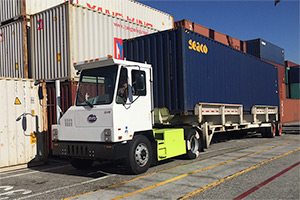California Pilot Program Kicks Off to Test Electric Yard Trucks for Daily Commercial Use

Two Ontario, California, logistics companies took delivery on four zero-emissions electric yard and service trucks as part of efforts to reduce air pollution in Southern California.
The four are the first of 27 from BYD Heavy Industries that will be divided between the two companies. The trucks are meant to stay on-site and not travel the public roadways.
BNSF Railway and Daylight Transport warehouse logistics companies traditionally have used diesel trucks to move goods internally on their properties. Regional and business leaders and air quality officials hope the increasing use of electric trucks in the future will cut down on truck exhaust, which is a leading cause of air pollution in the Inland Empire.
On March 10, Daylight Transport, which is opening its first Inland Empire warehouse in Fontana on March 20, welcomed four electric trucks manufactured by China-headquartered BYD. The company has a manufacturing plant in Lancaster. The occasion was marked by an event organized by the state of California, the San Bernardino Council of Governments and the two logistics companies.
With yards in San Bernardino and Los Angeles, BNSF will receive 23 electric trucks over the next year, BNSF spokeswoman Lena Kent said.
The new BYD trucks were funded by a $9 million grant awarded to the San Bernardino Council of Governments through the California Air Resources Board. The trucks are part of a pilot program to test zero-emissions stechnology in daily commercial use.
Each of the large, electric freight-carrying trucks costs about $300,000 — three times as much as a traditional diesel truck.
“It’s expensive, and so many of those trucks are operated by small-business owners, guys who have one truck, two trucks. They can’t afford the amount of investment to buy one of these trucks on their own,” San Bernardino County Supervisor Janice Rutherford said. “That’s why we really need the support of [CARB] and the federal government for grants and for funding to help small businesses and larger businesses make that conversion because that’s a benefit for every single one of us who live here or breathe here.”
Andy Swanton, vice president of truck sales for Los Angeles-based BYD, said the company hopes to bring down the cost its electric trucks.
“We think that within five years, we’ll be competitive in every way shape or form. Right now, there’s a lot of batteries onboard these vehicles, so cost is a hurdle for us to get by,” Swanton. “But once we get the cost down, technology is advancing at such a rapid rate that within five years, we should be very competitive within our incentives or regulations for people to adopt the technology and incorporate it into their fleet.”
BNSF won’t commit to implement the electric vehicles on a larger scale until the company gets a chance to evaluate how well they work and tally the associated costs, Kent said.
“Hopefully, the cost will come down. More of them are being produced, and the cost of electricity is something we have to factor into that,” Kent said. “That’s something we’re willing to test out and see how it works in our daily operation.”
Daylight Transport Executive Vice President Greg Steele said the company uses 100% electric forklifts, and the new BYD electric trucks will comprise 15% of the company’s truck fleet.
“We want to use every vehicle we possibly can to eliminate fossil fuels,” Steele said.
"We have a 600-kilowatt solar system on the roof of this facility, and we think that with the assistance of [a wind turbine,] we would not need to pull from any type of utility or fossil fuel to keep this facility running on a daily basis," he added.

